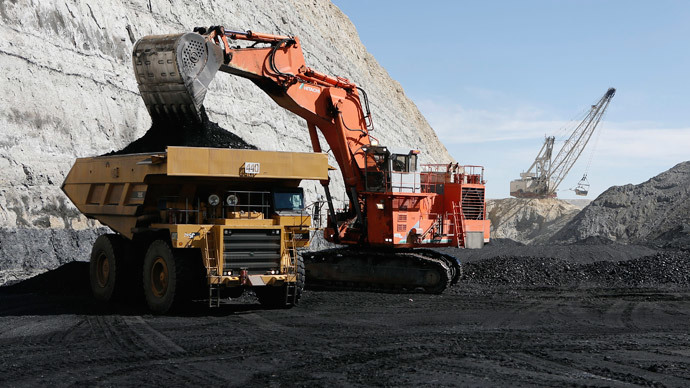Wyoming coal companies use subsidiaries to evade royalty payments for mining on public lands

Nearly half of the coal produced from federal land in Wyoming is initially sold to subsidiaries of companies that mined the coal, helping those entities avoid paying a royalty to the government. New rules proposed in December aim to address the loophole.
To address the loophole, the Office of Natural Resources Revenue
proposed this week changes in how coal
companies operate at first point of sale, aiming to curb
companies’ captive transactions.
The new rules address "regulations governing valuation for
royalty purposes of oil and gas produced from Federal onshore and
offshore leases and coal produced from Federal and Indian
leases." A 60-day public comment on the proposal began this
week and will end on March 9.
Coal companies say the proposed rule changes would ultimately
reduce the amount of coal being mined, thus reducing royalty
payments overall.
Rick Curtsinger, a spokesman for Cloud Peak Energy, the state’s
largest coal company, told Wyoming Public Media that the new
rules will “have a chilling effect on investment while adding
to the large regulatory burden already faced by the
industry.”
In the largest coal-producing state in the US, more than 40
percent of coal that comes from public lands is sold by five of
the largest coal companies working in the Powder River Basin to
one of their 566 shell subsidiaries that will then sell the
product, according to a new report by the Center for American Progress.
These deals, called “captive transactions,” are part of
a strategy to effectively avoid federal and state royalty
payments and taking full advantage of tax subsidies from the US
Department of Interior.
Federal law mandates that coal companies pay a 12.5 percent
royalty, according to Wyoming Public Media, to the
government on the first sale to another company of coal mined on
public properties. Coal can then be sold many times before ending
up with a power plant or utility.
Yet, with a network of hundreds of subsidiaries, coal companies
can sell to their own entities or partners, thus paying royalties
based on artificially low prices. Much of the coal is exported
based on falling demand.
“Increasingly, the major coal companies are selling Powder
River Basin coal not on an open market, but to an elaborate
network of shell companies that they own and
control,”said Matt Lee-Ashley, a senior fellow and
director of the Public Lands Project at Center for American
Progress, in a press release.
“This gaming of the system is costing federal and state
governments millions of dollars in lost royalty payments and
giving the Powder River Basin an unfair advantage over other U.S.
coal producing regions.”
.@NationalMining responds to our #coal report: "no significant market changes in the last 25 years" https://t.co/39Jk3UoB8z
— Matt Lee-Ashley (@MLeeAshley) January 7, 2015
...Yet captive transactions in Wyoming have jumped 17-fold since 2004. 40% of WY #coal now being sold by companies to themselves.
— Matt Lee-Ashley (@MLeeAshley) January 7, 2015
As coal companies resist the rule changes, taxpayer advocates
aren’t enamored with the new rules, either. The Center for
American Progress pointed out that the changes will allow coal
companies to “still pay royalties on a price that is below
the true market value.”
“Additionally, the massive subsidies given to the coal
industry, through reductions in royalties due to financial
hardships and deductions for transportation and washing, will
remain in place,” the organization said in calling for
tougher rules on how royalties are assessed at the final point of
sale and how subsidies are awarded to the industry.
Most of the land in the Powder River Basin is owned by the
federal government, and much of the coal mined there is shipped
overseas, according to Grist.org.
Joe Smyth, of Greenpeace, has written that weak oversight by the
federal Bureau of Land Management has allowed major companies
like Peabody and Cloud Peak Energy to access coal on public lands
“for bargain rates.”
“Over the last 30 years, this has amounted to a $28.9 billion
subsidy to the coal mining industry and helped coal maintain its
large share of US electricity generation by keeping coal prices
artificially low,” Smyth wrote in 2012.
“These low prices have also helped the Powder River Basin
soar from just 5% of US coal production in 1970 to almost half
today — even though the Federal Government no longer classifies
the region as a coal-producing region. If this sounds absurd,
that’s because the BLM’s process for leasing US coal is skewed to
benefit coal mining companies, lacks proper oversight and public
participation, and is basically corrupt,” he added.
A recent report by an environmentalist think tank details
further this relationship between companies and the government.
“Although a growing share of federal coal is exported to
overseas customers, the BLM has almost completely ignored the
value of export sales when determining the minimum price it will
accept for federally owned coal,” according to the Sightline
Institute.
“The failure to assess the economics of coal exports has led
the agency to systematically underprice coal owned by the
American public, potentially leading to millions of dollars in
foregone revenue each year.”












